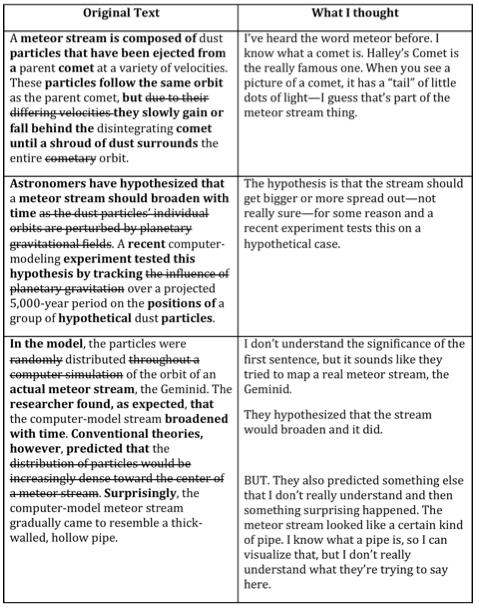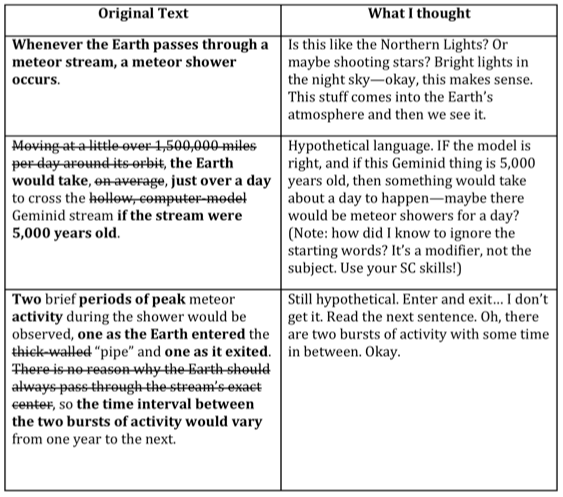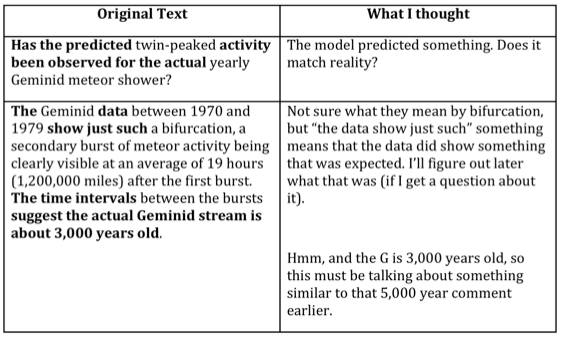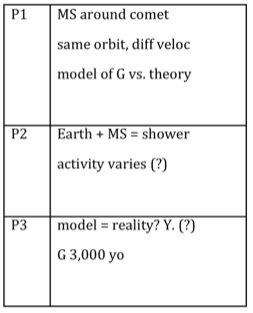-
Target Test Prep's 2024 GMAT Focus Edition prep is discounted for the BTG community!
Redeem
How to Read Tough Science Passages
 In the past, weve done some one-off review of parts of RC passages, but this time Ive got a full one for you.
In the past, weve done some one-off review of parts of RC passages, but this time Ive got a full one for you.
In this article, well look at how to get through this thing (and what to avoid).
Next week, well do a question or two.
I chose this passage from the free set of questions that comes with GMATPrep (that is, it doesnt actually show up in the practice CAT itself).
Its a longer passage, so give yourself approximately three minutes total to get through.
The Passage
A meteor stream is composed of dust particles that have been ejected from a parent comet at a variety of velocities. These particles follow the same orbit as the parent comet, but due to their differing velocities they slowly gain or fall behind the disintegrating comet until a shroud of dust surrounds the entire cometary orbit. Astronomers have hypothesized that a meteor stream should broaden with time as the dust particles individual orbits are perturbed by planetary gravitational fields. A recent computer-modeling experiment tested this hypothesis by tracking the influence of planetary gravitation over a projected 5,000-year period on the positions of a group of hypothetical dust particles. In the model, the particles were randomly distributed throughout a computer simulation of the orbit of an actual meteor stream, the Geminid. The researcher found, as expected, that the computer-model stream broadened with time. Conventional theories, however, predicted that the distribution of particles would be increasingly dense toward the center of a meteor stream. Surprisingly, the computer-model meteor stream gradually came to resemble a thick-walled, hollow pipe.Whenever the Earth passes through a meteor stream, a meteor shower occurs. Moving at a little over 1,500,000 miles per day around its orbit, the Earth would take, on average, just over a day to cross the hollow, computer-model Geminid stream if the stream were 5,000 years old. Two brief periods of peak meteor activity during the shower would be observed, one as the Earth entered the thick-walled pipe and one as it exited. There is no reason why the Earth should always pass through the streams exact center, so the time interval between the two bursts of activity would vary from one year to the next.
Has the predicted twin-peaked activity been observed for the actual yearly Geminid meteor shower? The Geminid data between 1970 and 1979 show just such a bifurcation, a secondary burst of meteor activity being clearly visible at an average of 19 hours (1,200,000 miles) after the first burst. The time intervals between the bursts suggest the actual Geminid stream is about 3,000 years old.
Heres how to read
When youre reading an RC passage, think about:
(1) What words or parts of the sentence are so complex that Im going to ignore them for now?
(2) When can I stop reading and start skimming?
(3) When do I have to start paying close attention again?
Below, I go through each paragraph, noting various things. Normal text means: I did read this but didnt pay extra attention to it. Boldface text really stood out for me: my brain perked up and paid attention.
I did technically read the strikeout textmy eyes looked at the wordsbut I actively avoided thinking about what they mean or how they fit into the overall message.
Lets try paragraph 1

Notice a few things. First, most of the bold words are normal wordsnot the crazy technical ones. Second, Im not entirely sure whats going on at the end of that first paragraph; the information is getting pretty detailed. And I dont care! Its okay not to understand that level of detail at this point. I know that the conventional theories and the computer-model test agree on one thing but something else was surprising. Thats good enough for now.
Paragraph 2

Most of the sentences were pretty detailed and confusing. I still dont get the whole enter and exit thing, but thats okay for now.
Paragraph 3

So the predicted activity did seem to match reality in some way, but the Geminid is only about 3,000 years old.
Taking Notes
Heres one example of a possible set of notes (but these will vary widely!)

The two question marks in parentheses are used to indicate Theres more detail here that I dont quite understandIll come back to it if / when I get a question about it.
Our notes are so skimpy! Notice how much we dont know. This is exactly where we want to be at this point in the passage. We have the big picture and we have a pretty good idea of where to go if we get asked about certain topics. The computer model vs. the conventional theories? Mid-to-late paragraph 1. A surprising result? End of paragraph 1. Something about the amount of activity or how old the MS is? Prediction or hypothetical is paragraph 2 and reality is paragraph 3.
Really? Thats all I need?
Yesfor now. Youre not actually done reading, though. When you get a question about a particular detail, you will go back and read that information to try to figure out the answer. Youre just deferringyoure going to get into the detail later, not right now during the initial read-through.
Why? Theres just not enough time. Luckily, we know that we arent going to get asked about all of these details only some of them. So why bother to learn those annoying details unless and until we know that we need them?
Check back next week, when well be tackling a question from the passage. In the meantime, happy studying!
Key Takeaways for Reading the Passage
(1) Half of the battle on RC is knowing what to read and what not to read. Concentrate on the core: the main subjects and verbs. Skim over the modifiers and details on the first read-through; youll come back to these later (IF you get a question about them).
(2) The bigger the words and the more complicated the sentences, the more likely well want to skim. Theyre going to use technical terms, such as cometary in paragraph 1, and theyll toss in long modifiers to slow us down. A recent computer-modeling experiment? How about just an experiment?
(3) Anticipate whenever you can. Astronomers have hypothesized A recent experiment tested this hypothesis. Okay, theyre probably going to tell me whether the results helped or hurt the hypothesis. Im going to keep an eye out for that.
* GMATPrep text courtesy of the Graduate Management Admissions Council. Usage of this question does not imply endorsement by GMAC.
This article is part of a Reading Comprehension series. Check out the other entries below:
Recent Articles
Archive
- June 2024
- May 2024
- April 2024
- March 2024
- February 2024
- January 2024
- December 2023
- November 2023
- October 2023
- September 2023
- July 2023
- June 2023
- May 2023
- April 2023
- March 2023
- February 2023
- January 2023
- December 2022
- November 2022
- October 2022
- September 2022
- August 2022
- July 2022
- June 2022
- May 2022
- April 2022
- March 2022
- February 2022
- January 2022
- December 2021
- November 2021
- October 2021
- September 2021
- August 2021
- July 2021
- June 2021
- May 2021
- April 2021
- March 2021
- February 2021
- January 2021
- December 2020
- November 2020
- October 2020
- September 2020
- August 2020
- July 2020
- June 2020
- May 2020
- April 2020
- March 2020
- February 2020
- January 2020
- December 2019
- November 2019
- October 2019
- September 2019
- August 2019
- July 2019
- June 2019
- May 2019
- April 2019
- March 2019
- February 2019
- January 2019
- December 2018
- November 2018
- October 2018
- September 2018
- August 2018
- July 2018
- June 2018
- May 2018
- April 2018
- March 2018
- February 2018
- January 2018
- December 2017
- November 2017
- October 2017
- September 2017
- August 2017
- July 2017
- June 2017
- May 2017
- April 2017
- March 2017
- February 2017
- January 2017
- December 2016
- November 2016
- October 2016
- September 2016
- August 2016
- July 2016
- June 2016
- May 2016
- April 2016
- March 2016
- February 2016
- January 2016
- December 2015
- November 2015
- October 2015
- September 2015
- August 2015
- July 2015
- June 2015
- May 2015
- April 2015
- March 2015
- February 2015
- January 2015
- December 2014
- November 2014
- October 2014
- September 2014
- August 2014
- July 2014
- June 2014
- May 2014
- April 2014
- March 2014
- February 2014
- January 2014
- December 2013
- November 2013
- October 2013
- September 2013
- August 2013
- July 2013
- June 2013
- May 2013
- April 2013
- March 2013
- February 2013
- January 2013
- December 2012
- November 2012
- October 2012
- September 2012
- August 2012
- July 2012
- June 2012
- May 2012
- April 2012
- March 2012
- February 2012
- January 2012
- December 2011
- November 2011
- October 2011
- September 2011
- August 2011
- July 2011
- June 2011
- May 2011
- April 2011
- March 2011
- February 2011
- January 2011
- December 2010
- November 2010
- October 2010
- September 2010
- August 2010
- July 2010
- June 2010
- May 2010
- April 2010
- March 2010
- February 2010
- January 2010
- December 2009
- November 2009
- October 2009
- September 2009
- August 2009